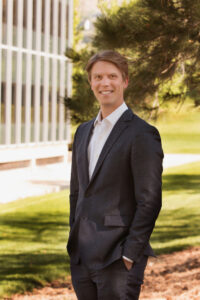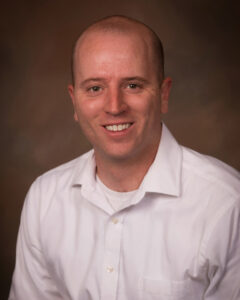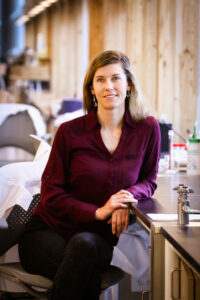Three University of Utah College of Engineering faculty members were awarded the National Science Foundation’s Faculty Early Career Development Program (CAREER) award for 2019, which supports “early-career faculty who have the potential to serve as academic role models in research and education and to lead advances in the mission of their department or organization.”
Each of the grants is for $500,000 or more over five years. Here are this year’s recipients so far:
 Michael Hoepfner (Chemical Engineering Assistant Professor)
Michael Hoepfner (Chemical Engineering Assistant Professor)
Hoepfner has received his grant for developing simulations on how molecules behave in order to more accurately predict how they organize. Typically, researchers simulate the behavior of molecules by predicting their properties on a macroscopic level, such as their density. But Hoepfner and his team want to find a better way to simulate those properties by using “neutron scattering” measurements to measure how molecules are organized in a solution or fluid.
“We can improve the accuracy of simulations, and we can then simulate how molecules or mixtures of molecules behave without having to synthesize them,” he said.
Hoepfner said he will be focusing his research on organic semiconductors. These are used in organic electronics such as OLED televisions or organic photovoltaics used for more efficient solar panels. These new simulations could also benefit the oil and gas industry.
“It feels good,” he said about receiving the award. “There have been generations of data collected to get this concept off the ground, so it’s great to finally be able to sink my teeth into the problem.”
Hoepfner received his bachelor’s in chemical engineering from the University of Utah and a master’s and doctorate from the University of Michigan, both in chemical engineering. He joined the U in 2013.
 Owen Kingstedt (Mechanical Engineering Assistant Professor)
Owen Kingstedt (Mechanical Engineering Assistant Professor)
If you bend, say, a paper clip repeatedly back and forth, the point where it bends will become hot. Kingstedt will examine the fundamental processes which convert the work that went into bending the paper clip into heat. Scientists do not have a very good grasp of the root cause of why some materials convert work to heat more efficiently than others.
Kingstedt’s research group will use experiments to study how magnesium alloys heat up when they are deformed over just a few milliseconds. Based on his findings, he hopes to better predict material performance during rapid events such as high-speed machining, ballistic impact or a vehicle crash.
This research could benefit car manufacturers, for example. By using magnesium alloys in place of aluminum alloys, car companies might be able to reduce vehicle weight, which would lead to improved fuel efficiency, reduced emissions and consumer savings at the pump.
Kingstedt joined the U in 2016. He received a bachelors in mechanical engineering from Michigan Technological University and a master’s and doctorate in aerospace engineering, both from the University of Illinois, Urbana-Champaign.
“It feels great to receive this award and be recognized by the NSF,” he said. “I believe this award is a reflection of the excellent efforts and strong mentoring we have here in the department.”
 Jessica Kramer (Bioemedical Engineering Assistant Professor)
Jessica Kramer (Bioemedical Engineering Assistant Professor)
We all hate mucus when we get a cold or flu. But a major component of mucus called mucins are essential to life. Mucus interfaces our tissues with the outside world, and every exposed wet surface in the body as well as our internal organs are covered with mucins.
But mucus is tricky to study because our cells make many different forms of mucins depending on the tissue and whether the tissue is healthy or diseased. These different forms make reproducible studies challenging. There is also a lack of sufficient quantity of human samples of each form for use in research. Consequently, most scientists use mucus obtained from farm animals.
Kramer’s grant involves developing a cell-free method to make specific forms of mucins. She will study how individual mucin proteins interact with salts, fats, other proteins and DNA to collectively form mucus. They will try to pinpoint the differences between mucus from different tissues and how bacteria, drugs, and nutrients interact with it. Eventually, she wants to create authentic models of human mucosal tissues to study nutrient absorption, fertilization, immunity and to develop new treatments for cystic fibrosis and cancer.
“I’m thrilled the importance of this project was recognized by the NSF and that my students will be supported,” Kramer said. “As a new professor, continuing the tradition of top-quality research at the U is very important to me, and this is an exciting leap in that direction.”
Kramer received a bachelors from the University of Utah and a master’s and doctorate from UCLA, all in chemistry. She joined the U in 2017.